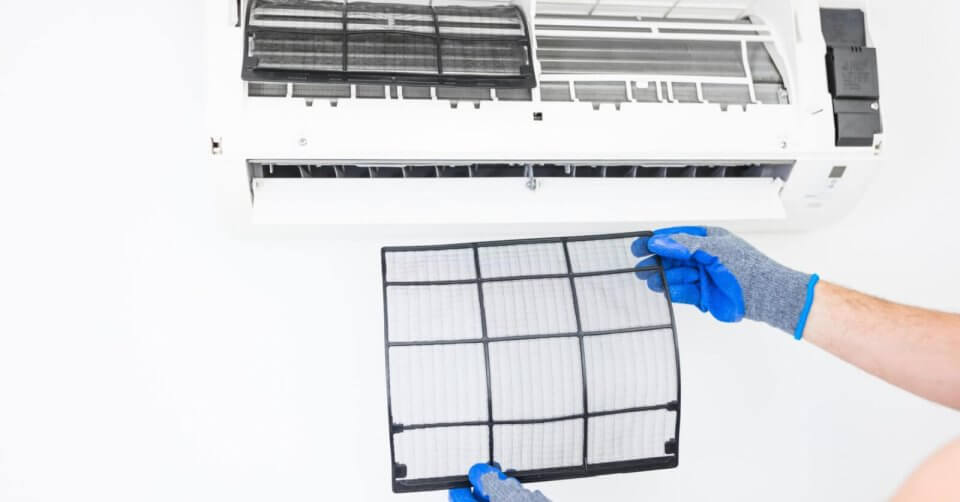Table of Contents
How to choose the right AC for your home?
Choosing the right AC unit for your home is essential to ensuring a comfortable living space. There are several factors to consider in order to make an informed decision.
Firstly, you need to determine the size of the room you want to cool. This is important as it will help you choose the appropriate size AC unit. A general rule of thumb is that for every square foot of living space, you will need around 20 BTUs (British Thermal Units) of cooling capacity.
Next, consider the climate and weather conditions in your area. If you live in a hot and humid climate, you may need a higher capacity AC unit to effectively cool your space. On the other hand, if you live in a cooler region, a smaller AC unit may suffice.
Energy efficiency is another crucial factor. Look for AC units with high energy efficiency ratings, such as those with Energy Star certification. These units are designed to consume less energy, resulting in lower energy bills.
Capacity, also referred to as tonnage, is another important consideration. The size of the unit’s condenser and the cooling capacity it provides should match the size of your space. A unit with insufficient capacity will struggle to cool the room, while one that is too large will cycle on and off frequently, wasting energy.
Lastly, consider the BTU rating of the AC unit. This measure indicates the cooling capacity of the unit. A higher BTU rating is suitable for larger rooms or areas with more heat sources, such as large windows or high ceilings.
By considering the size of your room, climate and weather conditions, energy efficiency, capacity/tonnage, and BTU rating, you can choose the right AC unit that will efficiently cool your home while keeping energy consumption and costs in check.
1. Size of the Room
When choosing the right AC unit for your space, one of the most important factors to consider is the size of the room. Assessing the size of the room will help you determine the appropriate cooling capacity needed to effectively cool the space.
To begin, measure the square footage of the room using a tape measure. Measure the length and width of the room and multiply these dimensions to calculate the total square footage. It is important to note that different units of measurement may be used in different regions, such as square meters instead of square feet.
Additionally, consider the ceiling height of the room. Rooms with higher ceilings may require a larger cooling capacity to maintain a comfortable temperature throughout the space. Take note of any heat sources in the room, such as large windows or appliances, as these can contribute to the overall heat gain and impact the cooling requirements.
Once you have determined the size of the room, you can calculate the cooling capacity needed. As a general rule of thumb, you will need approximately 20 BTUs (British Thermal Units) per square foot of living space. Multiply the total square footage of the room by 20 to find the appropriate cooling capacity in BTUs.
By accurately assessing the size of the room and calculating the cooling capacity needed, you can choose an AC unit that will provide ample cooling to keep your space comfortable, efficient, and cost-effective.
2. Climate and Weather
When choosing the right AC unit for your space, it’s essential to consider the climate and weather conditions in your area. Understanding the local climate is crucial as it directly impacts the cooling capacity and energy efficiency of the AC unit.
Firstly, take into account the average temperature of your region. If you live in a hot and humid climate, you will need an AC unit with a higher cooling capacity to combat the intense heat. On the other hand, in cooler climates, a lower cooling capacity may be sufficient.
Humidity levels also play a significant role in determining the appropriate AC unit. If you reside in a humid region, it’s crucial to choose an AC unit that not only cools but also dehumidifies the air effectively. High humidity levels can make the air feel even hotter and stickier, so selecting an AC unit with strong dehumidification capabilities can greatly improve comfort levels.
Additionally, extreme weather conditions, such as heatwaves or cold spells, can strain your AC unit’s performance. During heatwaves, when the outside temperature soars, the AC unit may struggle to maintain a comfortable temperature. On the other hand, during cold spells, your heating and cooling system may need to work harder to keep your space warm. Therefore, it’s essential to choose an AC unit that can handle such extreme weather conditions efficiently.
By taking climate and weather conditions into account, you can select an AC unit that meets your specific cooling needs, ensuring maximum comfort and energy efficiency.
3. Energy Efficiency
When choosing an AC unit for your space, one of the most important factors to consider is energy efficiency. Not only does an energy-efficient AC unit help reduce your energy costs, but it also has a positive impact on the environment. Here are some tips to help you select an energy-efficient AC unit:
1. Look for Energy Efficiency Ratings: Energy efficiency ratings, such as the Seasonal Energy Efficiency Ratio (SEER) and the Energy Efficiency Ratio (EER), provide valuable information about an AC unit’s efficiency. The higher the SEER and EER ratings, the more energy-efficient the unit. Look for units with higher ratings to ensure optimal energy savings.
2. Opt for ENERGY STAR Certified Units: ENERGY STAR certified AC units meet strict energy efficiency guidelines set by the U.S. Environmental Protection Agency. These units are designed to consume less energy, resulting in lower energy bills and reduced greenhouse gas emissions.
3. Consider Variable Speed Technology: AC units with variable speed technology are more energy-efficient compared to those with single-speed motors. These units can adjust their cooling capacity according to the desired temperature, resulting in energy savings.
4. Proper Sizing: Choosing the right-sized AC unit for your space is crucial. A unit that is too small will have to work harder and consume more energy to cool the area, while an oversized unit may waste energy. Use an AC size calculator or consult with a professional to determine the appropriate size for your space.
Selecting an energy-efficient AC unit not only helps you save on energy costs but also reduces your carbon footprint. By following these tips, you can make an informed decision and enjoy a comfortably cool space while minimizing your environmental impact.
4. Capacity or Tonnage
When it comes to choosing the right AC unit for your space, one important factor to consider is the capacity or tonnage. The capacity of an AC unit refers to its cooling power and is measured in British Thermal Units (BTUs) per hour. It determines how effectively the unit can cool a particular area.
To determine the appropriate capacity for your space, you need to consider the square footage of the room and the heat gain from various sources. The square footage gives you an idea of the size of the area that needs to be cooled, while the heat gain refers to the amount of heat that enters the space, making it hotter.
It is essential to select an AC unit with the correct capacity to ensure efficient cooling. If the unit is too small for the space, it will have to work harder and consume more energy to cool effectively. On the other hand, if the unit is too large, it may cycle on and off frequently, not reaching its optimal efficiency and potentially wasting energy.
AC units come in a range of capacities, typically ranging from 5,000 BTUs for smaller rooms to over 30,000 BTUs for larger areas. As a general guideline, a 5,000 BTU unit is suitable for rooms up to 150 square feet, while a 30,000 BTU unit can cool spaces up to 1,000 square feet.
Consider the size of your room and the heat sources present when determining the appropriate capacity for your AC unit. If you have large windows or face excessive heat gain from appliances, you may need to choose a unit with a higher capacity to ensure ample cooling.
By taking into account the capacity or tonnage of an AC unit, along with the size of your space and heat sources, you can ensure that you choose the right unit for optimal cooling efficiency.

Other factors to consider:
In addition to square footage and heat gain, there are several other factors that should be considered when choosing the right AC unit for your home. These factors can have a significant impact on the selection process and ensure that you choose an AC unit that is both efficient and effective in cooling your space.
Energy efficiency is a crucial factor to consider. Look for AC units with high energy efficiency ratings, such as those with the Energy Star label. These units are designed to consume less energy, resulting in lower energy bills and reduced environmental impact.
Insulation is another important consideration. Well-insulated homes retain cool air more effectively, reducing the strain on the AC unit and increasing its efficiency. Evaluate the insulation in your home before selecting an AC unit, and consider improving insulation if necessary.
The number of occupants in the space should also be taken into account. A larger number of people generate more body heat, requiring a higher cooling capacity. Additionally, the heat emitted by appliances and electronics should be considered. If you have several heat-generating devices in the room, you may need a larger AC unit to offset their impact.
The local climate and weather patterns are also significant factors to consider. Hotter climates will require AC units with higher cooling capacities to maintain a comfortable temperature. Similarly, regions with high humidity levels may benefit from AC units with dehumidifying features.
By considering these additional factors along with square footage and heat gain, you can ensure that you select an AC unit that is the perfect fit for your space, maximizing both comfort and energy efficiency.
Energy efficiency
When choosing an AC unit for your space, energy efficiency is a paramount consideration. Not only does an energy-efficient AC unit help protect the environment, but it can also save you money in the long run. By selecting an AC unit with high energy efficiency ratings, such as those with the Energy Star label, you can significantly reduce your operating costs and lower your energy bills.
Energy efficiency is determined by various factors. One key indicator is the Seasonal Energy Efficiency Ratio (SEER), which measures how efficiently an AC unit uses energy throughout the cooling season. The higher the SEER rating, the more energy-efficient the unit is. Additionally, consider the unit’s energy consumption, as lower energy consumption translates to lower operating costs.
When evaluating an AC unit’s energy efficiency, it’s essential to look for the Energy Star rating. This certification indicates that the unit meets or exceeds federal energy standards, ensuring optimal energy savings. By choosing an Energy Star AC unit, you can confidently enjoy a comfortable indoor environment while minimizing your environmental impact.
In summary, prioritizing energy efficiency when selecting an AC unit is crucial. By opting for an energy-efficient model with high SEER ratings and an Energy Star label, you can keep your operating costs down, save on energy bills, and contribute to a sustainable future.
Selecting the BTU Rating of Our Room Air Conditioner
When it comes to choosing the right AC unit for our space, one crucial factor to consider is the BTU rating. BTU, or British Thermal Units, measures the cooling capacity of an air conditioner. Determining the appropriate BTU rating for our room ensures efficient and effective cooling, while avoiding unnecessary energy consumption and costs.
To calculate the ideal BTU rating for our space, we need to consider several factors. Firstly, we should measure the square footage of the area we want to cool. This can be done by multiplying the length and width of the room in feet, which will give us the approximate square footage. Additionally, we need to assess other factors such as ceiling height, insulation, heat sources, and the number of people occupying the space.
Once we have these measurements and considerations, we can refer to a BTU chart or use an online calculator to determine the appropriate BTU rating. A general guideline is to allocate approximately 20 BTUs per square foot of living space. However, we may need to adjust this based on specific circumstances. For example, if the room has high ceilings or many windows, we may need a higher BTU rating to compensate for increased heat gain.
It’s important to note that choosing an AC unit with a BTU rating that is too high can lead to inefficient cooling and increased energy consumption. On the other hand, selecting a unit with a BTU rating that is too low may result in insufficient cooling, as the unit will struggle to reach and maintain the ideal temperature.
By carefully evaluating our room’s square footage, ceiling height, insulation, and other relevant factors, we can select an AC unit with the appropriate BTU rating. This will ensure ample cooling capacity, energy efficiency, and ultimately, a comfortable indoor environment.
What Are BTUs?
BTUs, or British Thermal Units, play a crucial role in determining the cooling capacity of an air conditioning (AC) unit. Understanding what BTUs are and how they are calculated is essential in choosing the right AC unit for a specific space.
BTUs measure the amount of heat energy needed to raise the temperature of one pound of water by one degree Fahrenheit. In the context of air conditioning, BTUs are used to measure the cooling capacity of an AC unit. The higher the BTU rating, the more cooling power the AC unit provides.
When selecting an AC unit, it is important to consider the BTU rating in relation to the size of the room to be cooled. An AC unit with a higher BTU rating is suitable for larger spaces, while a unit with a lower BTU rating is appropriate for smaller areas.
To determine the ideal BTU rating for a specific room, factors such as square footage, ceiling height, insulation, and any potential heat sources should be taken into account. A general guideline is to allocate 20 BTUs per square foot of living space. However, adjustments may be necessary depending on the specific circumstances.
Choosing an AC unit with the appropriate BTU rating ensures efficient and effective cooling, preventing energy wastage and unnecessary costs. By considering the square footage and other relevant factors, individuals can make an informed decision and create a comfortable environment in their space.
Ceiling Height
When choosing the right AC unit for your space, it is crucial to consider the ceiling height. The height of your ceilings can significantly impact the cooling capacity and efficiency of an air conditioner.
Taller ceilings create more cubic footage of air in a room, which means that a higher cooling capacity is required to adequately cool the space. If you choose an AC unit with insufficient cooling power for a room with tall ceilings, the air conditioner may struggle to reach and maintain the desired temperature, leading to discomfort and inefficient energy usage.
To ensure proper air circulation and temperature control, it is recommended to match the cooling capacity of the air conditioner to the height of the ceilings. Here are the general guidelines for different ceiling heights:
1. Standard Ceiling Height (8-9 feet): For rooms with standard ceiling heights, a cooling capacity of 20 BTUs per square foot is usually sufficient.
2. Tall Ceiling Height (10-12 feet): For rooms with tall ceilings, it is recommended to add an additional 10% of the cooling capacity for each foot above 9 feet. For example, if your ceiling height is 11 feet, you would multiply the square footage of the room by 22 BTUs per square foot.
By considering the ceiling height when selecting an AC unit, you can ensure proper air circulation, efficient cooling, and comfortable temperatures in your space. Keep in mind that these are general guidelines, and it is advisable to consult with a professional or refer to the manufacturer’s specifications for more precise recommendations.
Tips for Choosing the Right Air Conditioner for You
Introduction:
Choosing the right air conditioner for your space is crucial to ensure proper cooling and energy efficiency. With a wide range of options available, it can be overwhelming to determine which AC unit is best suited for your needs. By considering factors such as room size, ceiling height, energy efficiency, and cooling capacity, you can make an informed decision that will keep you comfortable and save on energy bills in the long run.
1. Assess the Size of Your Space:
Before selecting an air conditioner, measure the square footage of the room you need to cool. This measurement will help you determine the appropriate cooling capacity required to keep the room at a comfortable temperature. A rule of thumb is to aim for 20 BTUs per square foot for rooms with standard ceiling heights (8-9 feet). If you have tall ceilings (10-12 feet), add an additional 10% of cooling capacity for each foot above 9 feet.
2. Consider Energy Efficiency:
Energy-efficient air conditioners not only help to reduce your carbon footprint but also save you money on energy bills. Look for air conditioners with a high SEER (Seasonal Energy Efficiency Ratio) rating or an Energy Star certification. These units operate more efficiently, consuming less energy while delivering optimal cooling performance.
3. Understand the Types of Air Conditioners:
There are various types of air conditioners available, including window units, central air conditioners, split air conditioners, and portable air conditioners. Consider the pros and cons of each type in relation to your space and needs. Window units are typically suitable for single rooms or apartments, while central air conditioners are ideal for cooling multiple rooms or larger spaces.
4. Account for Heat Sources:
Take into account any heat sources in the room when choosing an air conditioner. If the space receives a significant amount of sunlight or has heat-generating appliances, you may need an AC unit with a higher cooling capacity to offset the additional heat gain. Properly accounting for heat sources will help ensure that the air conditioner can effectively cool the room.
5. Evaluate Operating Costs:
In addition to the upfront cost of purchasing the air conditioner, consider the long-term operating costs. Look for units with energy-saving features, such as programmable thermostats and sleep modes, that can help reduce energy consumption and save money on your monthly utility bills. Additionally, check the estimated annual energy consumption to get an idea of the ongoing costs associated with running the chosen air conditioner.
| Room Size (sqm) | Capacity (kJ/hr) | Estimated HP Rating |
|---|---|---|
| Up to 15 sqm | 2,000 – 3,500 kJ/hr | 0.5 HP |
| 15 – 25 sqm | 3,500 – 5,000 kJ/hr | 0.75 HP |
| 25 – 35 sqm | 5,000 – 7,000 kJ/hr | 1.0 HP |
| 35 – 50 sqm | 7,000 – 10,000 kJ/hr | 1.5 HP |
| 50 – 70 sqm | 10,000 – 14,000 kJ/hr | 2.0 HP |
| 70 – 90 sqm | 14,000 – 18,000 kJ/hr | 2.5 HP |
| 90 – 110 sqm | 18,000 – 22,000 kJ/hr | 3.0 HP |
| 110 – 140 sqm | 22,000 – 28,000 kJ/hr | 3.5 HP |
Conclusion:
Choosing the right air conditioner involves considering factors such as room size, ceiling height, energy efficiency, types of air conditioners available, heat sources, and operating costs. By evaluating these factors and following the guidelines mentioned above, you can select an AC unit that suits your space, ensures comfortable temperatures, and helps you save on energy bills. Remember to consult with experts or refer to air conditioner size calculators if you’re unsure about the appropriate cooling capacity for your specific needs.
Split or Window
Split or Window Air Conditioner: Choosing the Right Option for Your Space
When it comes to choosing an air conditioner for your space, you’ll likely come across two popular options: split AC units and window AC units. Each has its own advantages and considerations, so it’s important to understand the differences and determine which option is best suited for your needs.
1. Installation and Space Requirements:
One of the key differences between split and window air conditioners is the installation process. Split AC units require professional installation, as they consist of two parts – the indoor unit that is mounted on the wall and the outdoor unit that is placed outside the building. On the other hand, window AC units are installed directly in a window or a specially designed hole in a wall.
If you are looking for a simpler installation process, a window AC unit may be more suitable. They are typically easier to install and can be done by most homeowners. However, if you have limited window space or prefer a more aesthetically pleasing option, a split AC unit might be the better choice.
2. Cooling Capacity:
Another factor to consider is the cooling capacity of the unit. Split AC units generally have a higher cooling capacity compared to window units. This means that they can cool larger spaces more effectively. If you have a spacious room or multiple interconnected rooms that need cooling, a split AC unit may be the better option.
On the other hand, if you have a smaller space or only need to cool a single room, a window AC unit can provide ample cooling. It’s important to note that both types of units come in a range of cooling capacities, so you can choose one that matches your specific needs.
3. Energy Efficiency:
Energy efficiency is an important consideration when selecting an air conditioner. Both split and window AC units come with energy efficiency ratings that indicate their efficiency in converting electricity into cooling power. Look for units with higher energy efficiency ratings to save on energy costs in the long run.
However, it’s worth noting that split AC units tend to be more energy-efficient than window units. Split units have separate components for indoor and outdoor spaces, allowing for better temperature regulation and reduced energy consumption. If energy efficiency is a top priority or if you plan to use the AC frequently, a split AC unit may be the more efficient choice.
4. Aesthetics and Noise Level:
The aesthetic aspect of your air conditioner might be important to consider, particularly if you want to maintain the appearance of your space. Window AC units can be bulky and more visible from the outside, while split AC units have a sleeker and more discreet appearance as only the indoor unit is visible.
In terms of noise level, both split and window AC units produce some level of noise during operation, but split units tend to be quieter. This is because the compressor, which is the main source of noise, is located in the outdoor unit for split ACs. If noise is a concern, especially for bedrooms or areas where silence is important, a split AC unit may be the better choice.

Are inverters best option to save on AC billls?
Inverters or inverter technology in air conditioners can be an excellent option for saving on AC bills compared to traditional non-inverter AC units. Here’s why:
- Energy Efficiency: Inverter ACs are more energy-efficient than non-inverter models. They have variable-speed compressors that can adjust the cooling capacity based on the room’s temperature requirements. This means they don’t run at full power constantly, which saves energy and reduces electricity bills.
- Constant Comfort: Inverter ACs can maintain a more stable and comfortable indoor temperature. They can adjust their cooling output more precisely, avoiding the frequent on/off cycles that non-inverter ACs use. This results in a more consistent and comfortable environment.
- Faster Cooling: Inverter ACs can cool a room faster during the initial cooling phase. Once the desired temperature is reached, they reduce their capacity to maintain the set temperature, further saving energy.
- Reduced Wear and Tear: Non-inverter ACs experience more wear and tear because of the frequent starting and stopping of the compressor. Inverter ACs have a softer start and stop, which can lead to a longer lifespan and fewer maintenance costs.
- Lower Operating Costs: Due to their energy efficiency, inverter ACs generally have lower monthly operating costs, which can add up to significant savings over time.
While inverter ACs have many advantages in terms of energy efficiency and comfort, it’s important to consider the initial purchase cost. Inverter ACs tend to be more expensive upfront compared to non-inverter models. However, the long-term savings on energy bills can often offset the higher initial investment.
Conclusion:
Choosing between a split AC unit and a window AC unit ultimately depends on your specific needs and preferences. Consider factors such as installation process, cooling capacity, energy efficiency, aesthetics, and noise level when making your decision. By carefully evaluating these factors, you can select the right air conditioning option that will keep your space cool and comfortable while also keeping your energy bills in check.
Insulation
Insulation plays a vital role in choosing the right air conditioner for your space. It significantly impacts the efficiency and effectiveness of the AC unit, ensuring that your space remains cool and comfortable while minimizing energy consumption.
Proper insulation creates a barrier between the indoor and outdoor environments, preventing heat transfer and maintaining the desired temperature. It helps retain the cool air inside during hot summer months and keeps the warm air inside during colder seasons, reducing the workload on your air conditioner.
There are different types of insulation available, each with its own impact on energy consumption and cooling capacity. For example, fiberglass insulation is commonly used and provides excellent thermal resistance. It effectively reduces heat gain, making your air conditioner more efficient.
Another type of insulation is foam board insulation, which has a higher insulating value and minimizes energy loss. It acts as a barrier against the transfer of heat and cold between the inside and outside of your space, allowing your AC unit to work more effectively.
Spray foam insulation is another option that provides a seamless and airtight barrier, preventing air leakage and maximizing energy efficiency. It helps reduce cooling loads by ensuring the cool air remains inside, resulting in lower energy consumption.
By choosing the right type of insulation for your space, you can improve the efficiency and effectiveness of your air conditioner. It is important to consider the insulation needs of your specific space before selecting an AC unit. Proper insulation will not only save you money on energy bills but also provide a more comfortable environment.
Number of occupants
When choosing the right AC unit for your space, it’s essential to consider the number of occupants who will be in the room. The number of people can have a significant impact on the cooling capacity required for your AC unit.
As more occupants are present in a space, the amount of body heat generated increases. This additional heat can make the room feel uncomfortable and stuffy if not properly cooled. Therefore, it’s crucial to choose an AC unit with a higher cooling capacity to effectively manage the increased heat load.
The size of the AC unit also depends on the number of occupants. With more people, a larger AC unit is necessary to maintain a comfortable temperature. A smaller or undersized unit may struggle to cool the space adequately, leading to discomfort.
Moreover, considering the number of occupants improves energy efficiency. By selecting an AC unit that matches the cooling requirements of the space, you can prevent excessive energy consumption and reduce your energy bills.
To determine the appropriate size of the AC unit based on the number of occupants, it’s advisable to consult an HVAC professional. They can conduct calculations based on factors such as the size of the room, ceiling height, and heat sources to recommend the ideal AC unit that will provide ample cooling for your specific needs.
In conclusion, the number of occupants in a space affects the choice of an AC unit. More occupants generate additional body heat, requiring a larger cooling capacity to maintain a comfortable temperature. By considering the number of occupants, you can ensure optimal cooling performance and energy efficiency for your space.
Conclusion
In conclusion, selecting the right air conditioning unit for your home is a crucial decision that impacts both your comfort and energy efficiency. To make an informed choice, it’s essential to consider several factors, including the size of the room or space you need to cool, the cooling capacity in kilojoules per hour (kJ/hr), and the estimated horsepower (HP) rating. However, these figures are just starting points, and you should also account for insulation, climate conditions, and any specific cooling requirements you may have.
Additionally, consulting with HVAC professionals or referring to manufacturer guidelines can provide valuable insights into the ideal AC unit for your needs. Investing time and effort into this decision will not only ensure your home remains comfortable but also contribute to energy savings and a more environmentally friendly cooling solution. Ultimately, choosing the right AC unit is a balance between efficiency, comfort, and cost, and it’s a decision well worth making with care and consideration.
























